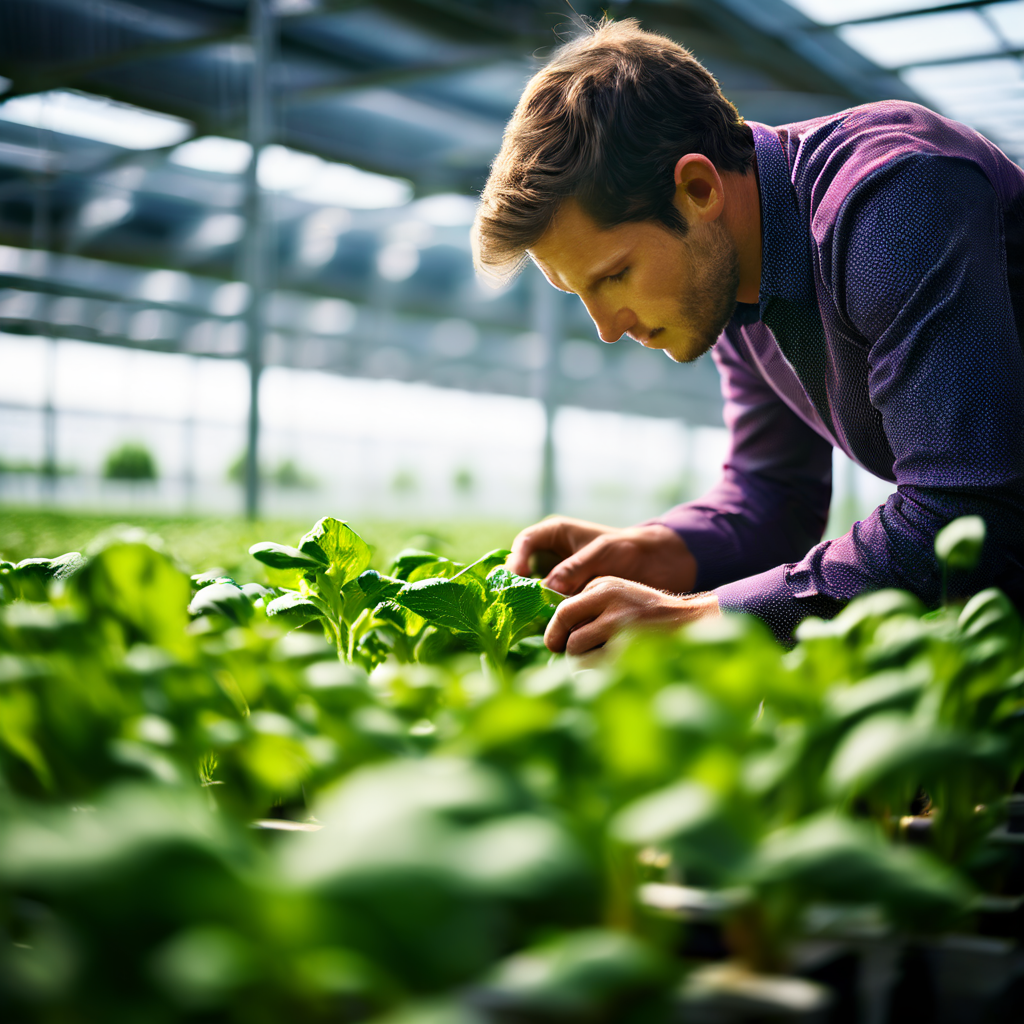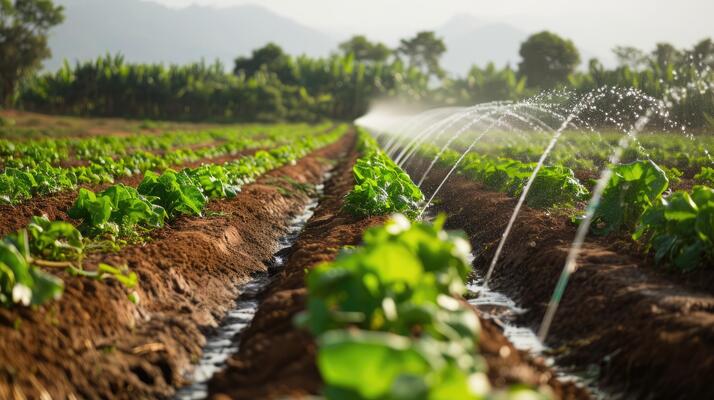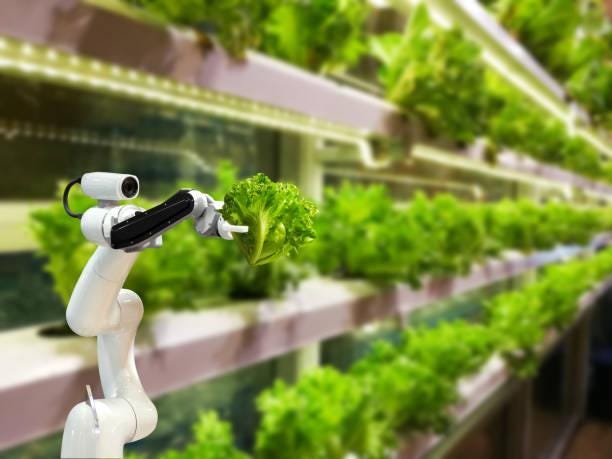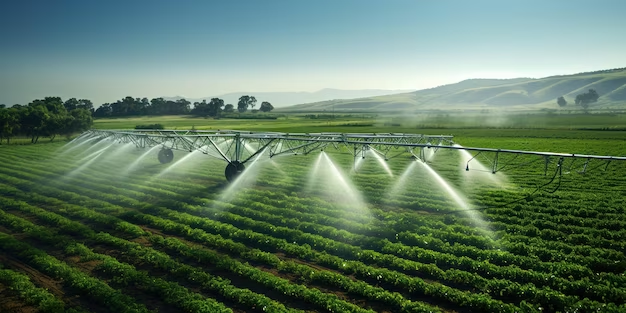AI is transforming precision agriculture – Key Takeaways
- Optimizing Resource Use: AI-driven smart irrigation systems use real-time data to conserve water and enhance crop productivity.
- Early Detection and Intervention: AI systems identify crop diseases and stress early, allowing for prompt action and healthier crops.
- Data-Driven Decision Making: AI analyzes vast data to help farmers make informed decisions, optimizing crop management and yields.
- Automation and Labor Efficiency: AI-powered robots perform tasks like planting and harvesting, reducing labor costs and increasing efficiency.
- Sustainability and Environmental Impact: AI reduces chemical use, conserves water, and optimizes energy consumption, promoting sustainable farming practices.
- Customized Irrigation Plans: AI creates tailored irrigation schedules based on specific crop and soil needs.
- Predictive Maintenance: AI predicts equipment failures, preventing downtime and ensuring smooth operations.
- Enhanced Crop Yield and Quality: AI optimizes growing conditions, resulting in higher yields and better-quality produce.
- Market Forecasting and Supply Chain Optimization: AI helps predict market trends and optimize supply chains, reducing waste and improving profitability.
- Cybersecurity and Risk Management: Robust cybersecurity measures are essential to protect AI-powered agricultural systems from cyber-attacks.

Welcome to the future of farming! Agriculture is undergoing a revolutionary transformation, thanks to the power of Artificial Intelligence (AI). From optimizing resource use to enhancing crop yields, AI is making farming smarter, more efficient, and sustainable. In this blog post, we’ll explore ten incredible ways AI is reshaping precision agriculture and vertical farming. So, let’s dive in and see how technology is cultivating a new era in agriculture!
1. Optimizing Resource Use

One of the most significant benefits of AI in agriculture is its ability to optimize resource use. AI-driven smart irrigation systems use real-time data from soil moisture sensors, weather forecasts, and crop requirements to ensure water is applied precisely when and where it’s needed. This not only conserves water but also enhances crop productivity. For instance, AI algorithms can predict soil dryness and calculate the exact water quantity required for the next irrigation cycle, reducing wastage and improving efficiency.
In a lettuce farm, AI algorithms adjusted the water usage based on real-time data from IoT sensors, reducing water consumption by 25% while maintaining optimal growth conditions.
2. Early Detection and Intervention
AI systems are game-changers when it comes to early detection and intervention. They can identify crop diseases, pests, and stress before they become visible to the human eye. AI-enabled sensors and cameras monitor crop health in real-time, allowing farmers to take prompt action and prevent crop losses. This proactive approach minimizes the use of chemicals and ensures healthier crops.
Using convolutional neural networks (CNNs), researchers have developed models that can detect diseases in tomato leaves with an accuracy of up to 97.49%, enabling early intervention and reducing crop losses.
3. Data-Driven Decision Making
In the age of big data, AI helps farmers make informed decisions by analyzing vast amounts of data from various sources, including weather conditions, soil health, and crop status. Predictive analytics and machine learning models provide insights that enhance crop management, leading to better yields and reduced costs. By leveraging data, farmers can optimize planting schedules, predict yields, and detect diseases early on.
AI-driven platforms analyze historical weather data and current soil conditions to recommend the best planting times and crop varieties, resulting in a 15% increase in yield for a corn farm.
4. Automation and Labor Efficiency

AI-powered robots and automated systems are revolutionizing labor efficiency in agriculture. These technologies can perform tasks such as planting, harvesting, and pest control more efficiently than human labor. This not only addresses labor shortages but also reduces operational costs. In vertical farming, automation ensures consistent and high-quality production with minimal human intervention.
FarmDroid, a solar-powered, GPS-driven seeding and weeding robot, can autonomously plant seeds and control weeds, significantly reducing the need for manual labor and increasing efficiency.
5. Sustainability and Environmental Impact
AI technologies contribute significantly to sustainable farming practices. By reducing the use of chemicals, conserving water, and optimizing energy consumption, AI helps create environmentally friendly farming systems. Vertical farming, driven by AI, uses significantly less land and water compared to traditional farming methods. AI also supports the use of renewable energy sources and efficient resource management, further enhancing sustainability.
A vertical farming facility using AI and IoT reduced its water usage by 70% and energy consumption by 40% compared to traditional farming methods, while maintaining high crop yields.
6. Customized Irrigation Plans

AI can create customized irrigation plans tailored to specific crops and soil types. By understanding the unique water needs of each crop and the characteristics of the soil, AI systems can optimize irrigation schedules to maximize water use efficiency and crop yield. The integration of IoT devices and remote sensing technologies allows for precise water management, ensuring that crops receive the right amount of water at the right time.
In a vineyard, AI-driven irrigation systems adjusted water delivery based on soil moisture levels and weather forecasts, resulting in a 20% increase in grape quality and a 30% reduction in water use.
7. Predictive Maintenance
AI plays a crucial role in predictive maintenance, preventing equipment failures and ensuring smooth farming operations. By monitoring machinery health and predicting maintenance needs, AI helps farmers avoid costly downtime and extend the lifespan of their equipment. This proactive approach to maintenance enhances operational efficiency and reduces the risk of unexpected breakdowns.
John Deere’s AI-powered predictive maintenance system monitors tractor performance and predicts potential failures, allowing farmers to perform maintenance before issues arise, reducing downtime by 15%.
8. Enhanced Crop Yield and Quality
AI optimizes growing conditions to enhance crop yield and quality. In vertical farming, AI controls light, temperature, and humidity to create the ideal environment for plant growth. Machine learning algorithms analyze data to fine-tune these conditions, ensuring that crops receive the optimal care they need to thrive. This results in higher yields and better-quality produce.
An AI-driven vertical farming system optimized the growing conditions for leafy greens, resulting in a 30% increase in yield and a 25% improvement in nutrient content.
9. Market Forecasting and Supply Chain Optimization
AI helps farmers predict market trends and optimize supply chains. By analyzing data on consumer demand, weather patterns, and crop yields, AI can forecast market conditions and help farmers make strategic decisions. This enables better inventory management, reduces waste, and ensures that farmers can meet market demands efficiently. AI-driven supply chain optimization enhances the overall economic viability of farming operations.
A farm cooperative used AI to analyze market trends and optimize their supply chain, reducing post-harvest losses by 20% and increasing profitability by 10%.
10. Cybersecurity and Risk Management
As AI becomes more integrated into agriculture, cybersecurity and risk management become increasingly important. AI systems are vulnerable to cyber-attacks, which can disrupt farming operations and lead to significant financial losses. Implementing robust cybersecurity measures and ethical guidelines is crucial to protect these systems. Farmers must stay informed about potential risks and take proactive steps to safeguard their data and machinery.
John Deere tractors have been found to have vulnerabilities that could be exploited by hackers. Ethical hackers have identified these weaknesses, prompting the company to enhance its cybersecurity measures to protect against potential attacks.
Conclusion
AI is undeniably transforming precision agriculture and vertical farming, making them more efficient, sustainable, and productive. From optimizing resource use to enhancing crop yields, AI technologies are revolutionizing the way we farm. As we continue to embrace these advancements, the future of agriculture looks brighter than ever. By leveraging the power of AI, we can cultivate a more sustainable and prosperous world for generations to come.
References:
[1] https://arxiv.org/ftp/arxiv/papers/2312/2312.00030.pdf
[2] https://www.ncbi.nlm.nih.gov/pmc/articles/PMC10894121/
[3] https://arxiv.org/abs/2312.00030
[4] https://www.xenonstack.com/blog/crop-disease-detection-with-ai-early-identification-and-prevention-strategies
[5] https://www.linkedin.com/pulse/role-artificial-intelligence-agriculture-enhancing-efficiency-viraj
[6] https://www.linkedin.com/advice/1/how-can-vertical-farming-benefit-from-ai
[7] https://green.org/2024/01/30/emerging-technologies-in-vertical-farming/
[8] https://link.springer.com/article/10.1007/s11119-023-10061-5
[9] https://www.mdpi.com/2073-4395/11/6/1227
[10] https://voimaventures.com/market-study-deep-dive-vertical-farming/
[11] https://www.mdpi.com/2077-0472/13/8/1593
[12] https://www.sciencedirect.com/science/article/pii/S2589721721000350
[13] https://www.mdpi.com/2218-6581/13/2/33
[14] https://www.nature.com/articles/s41598-023-34079-x
[15] https://www.automateshow.com/blog/from-soil-to-tech-the-impact-of-automation-in-agriculture
[16] https://gcgh.grandchallenges.org/challenge/tools-and-technologies-broad-scale-pest-and-disease-surveillance-crop-plants-low-income
[17] https://www.usda.gov/media/blog/2020/08/27/automation-helps-solve-specialty-crop-challenges
[18] https://www.plugandplaytechcenter.com/resources/how-automation-transforming-farming-industry/
[19] https://graindatasolutions.com/data-driven-agriculture-ai-role-farming/
[20] https://apsjournals.apsnet.org/doi/10.1094/PDIS-03-15-0340-FE

